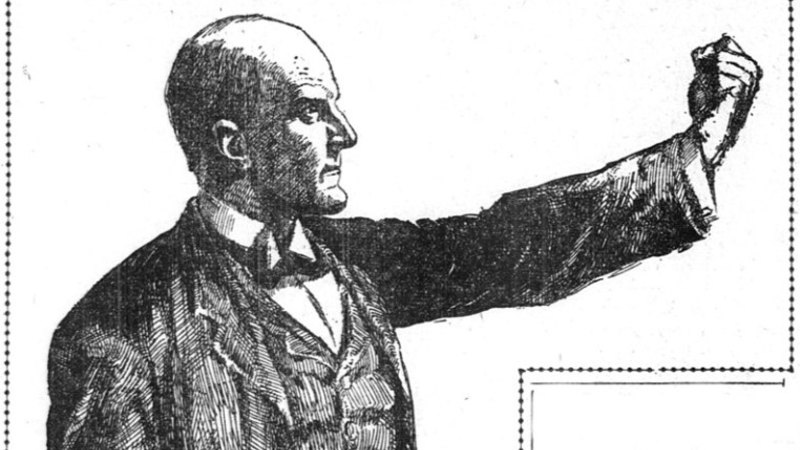Washington: Eugene V. Debs did not speak on election night in 1920. The Socialist presidential contender was, in his words, a “candidate in seclusion,” imprisoned in the Atlanta Federal Penitentiary for speaking out against America’s draft during World War I.
Outside the lockup, his supporters handed out photos of Debs in convict denim along with campaign buttons for “Prisoner 9653.” Reporters had hoped to hear a fiery oration. But the warden did let Debs write out a statement.
American labor leader and five time candidate for President of the United States Eugene V. Debs. The illustration was created by The Oregonian artist Harry Daniel Murphy after a speech by Debs in Portland, Oregon on September 26, 1904.Credit:Wikicommons
“I thank the capitalist masters for putting me here,” he wrote. “They know where I belong under their criminal and corrupting system. It is the only compliment they could pay me.”
In 1920, Debs was no stranger to White House bids; he’d run for president on the Socialist Party ticket five times since 1900. Eight years earlier, he’d won 901,551 votes – about six percent of the vote. However, this time he was politicking from behind bars.
Now, after former president Donald Trump’s indictment by a grand jury in New York – making him the first ex-president in history to be charged with a crime – many voters are wondering whether Trump, who is seeking a return to the White House in 2024, could still run for president if he ended up in jail.
In short, yes. Case in point: Debs.
Eugene Debs was an American union leader, and five times the candidate of the Socialist Party of America for President of the United States.Credit:Getty
Debs had opposed US involvement in World War I, believing the war benefited only arms manufacturers and business interests. In July 1918, while speaking in a Canton, Ohio, city park, he denounced the “Junkers of Wall Street” and criticised the government for arresting antiwar activists.
“The working class who freely shed their blood and furnish the corpses have never yet had a voice in either declaring war or making peace,” he said. “It is the ruling class that invariably does both. They alone declare war, and they alone make peace.”
Under the Sedition Act of 1918, such words were treasonous. The act, an amendment to the Espionage Act of 1917, sought to silence those who spoke out about the war.
Eugene Debs running from prison.
Federal prosecutor Edwin Wertz, who had sent a stenographer to the park, announced he would indict Debs.
“No man,” Wertz said, “even though four times the candidate of his party for the highest office in the land, can violate the basic law of this land.”
Through his rabble-rousing orations, Debs had been the public – and charismatic – face of socialism. He founded the Socialist Party of America in 1901, but its roots went back to his work as a union organiser in the rail yards.
In the 16 years before the United States entered World War I, the Socialists elected congressmen in New York City and Milwaukee and put 40 mayors into city halls around the country.
In April 1917, only days after the United States entered the war, the party ratified an antiwar platform.
Though he ran for president five times, Debs was a reluctant leader. And he knew his campaigns were symbolic.
“There was virtually no chance that a Socialist (or any third-party candidate) would ever get the votes needed to break through the electoral college, so at best the party’s national ticket for president and vice president was always a way to raise awareness and encourage further organising of working-class people,” said Wesley Bishop, a historian at the Eugene V. Debs Foundation.
Debs’s trial for sedition was a mess. In testimony, it became clear that Wertz’s stenographer – a car salesman – had failed to transcribe most of the speech. Wertz called several draft-age men in a vain attempt to prove the speech discouraged registration. However, each one had registered, and one was even in uniform.
The defence called only one witness to the stand: Debs, who promptly admitted his guilt. Ignoring objections from prosecutors, the judge then allowed him to address the court for nearly two hours.
“What you may choose to do to me will be of small consequence after all,” Debs said, concluding his remarks. “I am not on trial here. There is an infinitely greater issue that is being tried in this court today. American institutions are on trial before a court of American citizens. Time will tell.”
The jury found him guilty. On November 18, 1918 – a week after Armistice Day – he was sentenced to three concurrent 10-year sentences and lost his right to vote. Though he appealed his conviction to the Supreme Court, Justice Oliver Holmes jnr found a clear intention to obstruct the draft.
So he ran for president from prison. In 1920, two years into Debs’s sentence, he garnered 913,693 votes, his highest vote total ever, and impressive considering he couldn’t make a single campaign stop or stump speech.
He promised that, if elected, he would pardon himself, something Trump has also considered. The winning candidate, Republican Warren G. Harding, promised a “return to normalcy,” restoring the prewar way of life.
Soon after Harding was inaugurated in March 1921, the warden at the federal prison in Atlanta drove Debs to the rail station. The prisoner boarded a train for a trip to Washington – unaccompanied and unsupervised – to meet with Attorney General Harry Daugherty at Harding’s behest. They met for three hours, then Debs quietly returned to prison.
The White House planned to keep the meeting secret, but Daugherty, a blustery politician, bragged about it to reporters. When the news hit the papers, veterans groups protested and Harding now had to factor in the political optics of their opposition. He finally released Debs on December 21, 1921 – just in time for Christmas.
“He is an old man, not strong physically,” said Harding when commuting the sentence to time served.
“He is a man of much personal charm and impressive personality, which qualifications make him a dangerous man calculated to mislead the unthinking and affording excuse for those with criminal intent.”
Perhaps the same could one day be said of Trump.
Washington Post
Get a note directly from our foreign correspondents on what’s making headlines around the world. Sign up for the weekly What in the World newsletter here.
Most Viewed in World
From our partners
Source: Read Full Article






